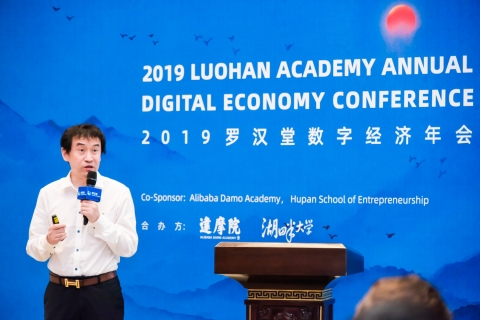Global academics gather to tackle challenging issues in the digital economy
HANGZHOU, China -- (BUSINESS WIRE) --
Luohan Academy, an open-research initiative by Alibaba Group, celebrated its first anniversary in Hangzhou this week, gathering Nobel Laureates, renowned economists, social scientists, tech pioneers and professors from leading universities to tackle the disruptions and other issues we face from rapid digitization of the global economy.
This press release features multimedia. View the full release here: https://www.businesswire.com/news/home/20190627005994/en/
The Academy was established last year to address the economic consequences and social disruptions caused by a tech-driven economy. Complementing Alibaba’s DAMO Academy, a global research program for cutting-edge technologies, Luohan Academy examines the implications that digital technologies will have on societies in the future.
Over two full days of presentations and panel discussions, participants aired their views on how to deal with the widening digital gap in the global economy and challenges in the job market caused by digital technologies. Other topics included whether a platform economy can be beneficial to all participants, whether we need new governance and regulations tailored for the digital age, what the new ethics underlying emerging technologies are and how to ensure the changes we’re seeing make the global economy more inclusive.
Dr. Chen Long, Director of the Luohan Academy, commented: “It was exciting to have over 200 renowned academics, including Nobel Laureates and economists, gather together, discussing and sharing their valuable insights on how to address universal challenges arising from the rapid development of digital technologies.”
“By drawing on the wisdom of global academics who come from different backgrounds and cultures, we hope the Luohan Academy can promote thought-provoking discussions on controversial, yet critical, issues facing society. These discussions could serve as a guidepost for social scientists, economists, educators, policy makers and private sector leaders to examine what roles they can play to bolster inclusive growth. As such, we hope to shed light on the path toward a more dynamic, balanced and fair digital economy.”
In Chinese’s Buddhist teachings, “Luohans” are enlightened and empathetic beings who are willing to take actions to alleviate world from suffering. Below are some issues discussed during the conference, with the intent to inspire more dialogues to maximize the benefits of technologies in the digital age:
- Should we first embrace digital technology or first address and attempt to control potential risks? It took 46 years for electricity to reach 50 million users, 14 years for computers, seven years for the Internet and 19 days for Pokemon Go. Decision-making time is getting shorter, and the cost of missing out by failing to make a decision or by making the wrong one has never been larger.
- Will technology widen the gap among people around the world or provide a level playing field? The technological revolution we’re undergoing has increased the number of people the earth can support from one billion to more than seven billion. But it has also triggered two world wars. Today, the key is to narrow the disparity in wealth, so we ask ourselves how we can benefit as many people as possible at the fastest speed.
- How will automation affect employment for humans? Will the ongoing tech revolution lead to new jobs and shorter working hours? What is the future of work?
- How will technology affect money transfers and payments across borders? Will digital financial services lead to more risks, even as they become more popular? What uncertainties will we face from purely digital money?
- What are the ethics of artificial intelligence? When you have an autonomous driving system using AI, and the driverless car has to make a split-second decision, should an algorithm make the unconscionable choice between hitting an old man on the left side of the road, or a child on the right, if impact cannot be avoided?
- Who owns data in the digital world and who should benefit from it? The records of car drivers aren’t particularly meaningful to most individuals. But, if shared, they make navigation software more accurate. Sole ownership doesn’t create as much benefit as pooling that data, provided privacy is protected.
For more information, please visit the website of the Luohan Academy: https://www.luohanacademy.com/about/start
About Luohan Academy
Luohan Academy was founded in Hangzhou on June 26th, 2018. It is an open research institute initiated by Alibaba Group and launched by world-renowned social scientists, which consist of the academy’s academic committee, including six Nobel Price laureates in economics. Luohan Academy will dedicate itself to collaborating with world-class social scientists and practitioners to collectively explore and shape the consensus regarding how to embrace the social and economic transformations brought by digital technology. The purpose of Luohan Academy is to serve the society at large, addressing the most important global challenges as well as having an eye for the humanity’s long-term future.
https://www.luohanacademy.com/about/start
View source version on businesswire.com: https://www.businesswire.com/news/home/20190627005994/en/
CONTACT:
Crystal Liu
Alibaba Group
+852 6378 5626
crystal.liu@alibaba-inc.com

Dr. Chen Long, Director of the Luohan Academy, spoke at the Luohan Academy Digital Economy Conference (Photo: Business Wire)































































































